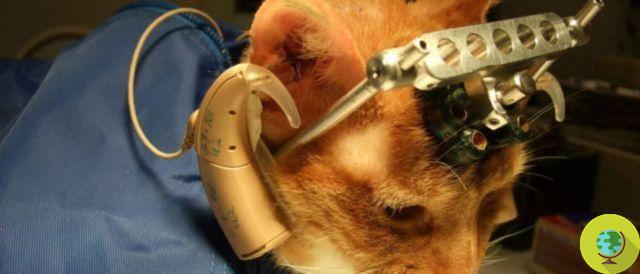
Disseminating, sharing and systematising data and methodologies for determining the risk of chemical substances without having to resort to further tests on animals: the Heroic project, the acronym that stands for "Health and environmental risks: organisatons, integration and cross- fertilization of scientific knowledge ”, of which the Catholic University of the Sacred Heart and its research center Opera of the Piacenza branch are part, aims to evaluate the impact of drugs, cosmetics and pesticides without resorting to tests on guinea pigs.
He is about to end up run over, his mother saves him
Disseminate, share and systematize data and methodologies for determining the risk of chemical substances without having to resort to further animal testing: progetto Heroic, l’acronimo che sta per “Health and environmental risks: organisatons, integration and cross-fertilization of scientific knowledge”, di cui fa parte l’Catholic University of Sacred Heart and its research center Opera of the Piacenza office, aims to evaluate the impact of drugs, cosmetics and pesticides without resorting to tests on guinea pigs.
Funded by the European Commission within the VII Framework Program, this project could mark an important step forward to say enough for animal experimentation conducted to check the level toxicological of chemicals included in cosmetics, drugs, pesticides, especially since it will not only provide guidance, but also tools that can improve risk assessment and minimization capabilities of animal testing in all EU member states. Heroic, which includes a wide range of toxic substances, from pesticides, to drugs, from biocides to cosmetics, from biological agents to mixtures of substances, will try to make the most of the data already available regarding exposure to chemicals: it is often possible to draw useful information for human exposure from exposure to the environment or vice versa.
In 199 the European Commission created the European Center for the Validation of Alternative Methods (Ecvam) within the Joint Research Center (JRC) of Ispra: to identify and effectively implement the alternatives to animal testing have been validated and a long series of alternative tests included in the OECD guidelines, especially related to cosmetics and pharmaceutical substances. With the Reach regulation of 2007, then, the alternative approach to animal testing is recommended for all chemicals on the market. Subsequently, in 2010 the Commission adopted new provisions to reduce and control animal tests as much as possible: all laboratories must obtain approval for studies to be carried out by the national authorities, which are responsible for denying authorization if there are alternative toxicity tests. .
But if for the cosmetics, the ban on animal testing is almost total, for the other types of chemical substances there is still a lot of room for improvement. And this is where the progetto Heroic: alternative techniques to tests on animals to determine the toxicity of chemicals are increasingly widespread, just think of in vitro techniques on cells or those of computerized prediction of the toxicity of substances. It is therefore essential to involve all the institutions operating in the field of risk assessment at European level, to facilitate their dialogue and cooperation and to develop concrete tools that facilitate a more sustainable risk assessment, giving rise to a coordination action aimed at harmonizing approaches. risk assessment. This is the ambitious goal of the project.
And we, what can we do to change the situation? We need to make our voices heard to urge intervention at the legislative level, but also to put pressure on industries for a change in the mentality of those who perform the tests. But we can also contribute significantly with our daily choices, by choosing only "cruelty free" cosmetics and home cleaning products, using drugs only if indispensable, always preferring generic ones, paying attention to the pet foods we buy, since many of the best-known brands finance vivisection, and, finally, adopting an animal saved from laboratories.
Roberta Ragni
Read also How to recognize cosmetics not tested on animals


























